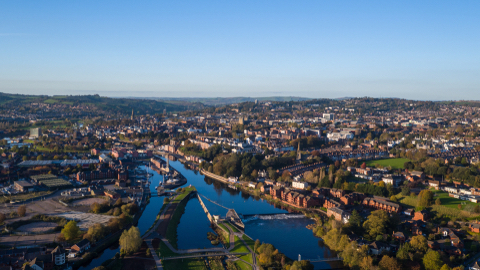
Exeter City Futures in the city of Exeter, UK has presented its Net Zero Exeter Plan to the city council, which focuses on issues of climate change, transport, energy, housing, and well-being.
The Plan sets out a series of practical actions that local authorities, organizations, and individuals can take which must be implemented in order to become net-zero carbon.
The Plan includes 12 goals to help the city become carbon neutral by 2030 and meet the challenges of congestion, energy consumption, pollution, poverty and inequality:
- reliable journeys and resilient roads;
- renewable energy access for everyone;
- clean air for Exeter;
- half of all journeys walked or cycled;
- affordable healthy homes for everyone;
- analytical and entrepreneurial city;
- reducing the dominance of cars;
- reduced energy consumption;
- smart energy measurement for everyone;
- self-financing city;
- waste as a resource; and,
- buildings that make more than they take.
The program already has the support of some of Exeter’s biggest organizations, including Exeter City Council, the University of Exeter, Royal Devon and Exeter NHS Trust, Devon County Council. and Exeter College.
Liz O’Driscoll, managing director at Exeter City Futures, said: ‘Despite the unprecedented coronavirus pandemic, I’m extremely pleased to present the Net Zero Exeter Plan to Exeter City Council and the city, on how Exeter can be carbon neutral by 2030. It has been four years in the making with collaboration with the many different communities, institutions, organisations and individuals who make up our city. More than ever the city needs to come together to think about the kind of future that we really want, and make it a reality.”